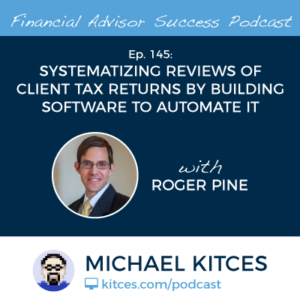 Welcome back to the 145th episode of Financial Advisor Success Podcast!
Welcome back to the 145th episode of Financial Advisor Success Podcast!
My guest on today's podcast is Roger Pine. Roger is the co-founder of Holistiplan, a new kind of tax planning software for advisors built to systematize and automate the process of reviewing a client's tax return to find the potential planning opportunities.
What's unique about Roger, though, is that he previously spent 10 years as a financial advisor in an independent advisory firm where he taught himself computer programming on the side implementing custom technology improvements for his own firm, before deciding to shift into becoming a full-time FinTech entrepreneur himself.
In this episode, we talk in-depth about the Holistiplan software that Roger developed. From leveraging optical character recognition to scan all the relevant information from an entire tax return PDF in just seconds, to converting that information into relevant tax observations about the client's tax bracket, phased-out deductions or tax credits, and the eligibility for tax preference contributions to retirement accounts, to the forward-looking tax planning tools that Holistiplan is now building to identify the client's true marginal tax bracket, taking into account all the phase-ins and phase-outs to make better forward-looking tax recommendations.
We also talk about the ever-blurring line between where a CPA's tax services end and a financial advisor's begin, the dynamics of trying to balance providing tax guidance and not unwittingly competing against potential CPA referral sources, and why Roger views Holistiplan's tax analyses as only the beginning of developing a comprehensive expert system that helps financial advisors craft more consistent recommendations across the full spectrum of the financial planning body of knowledge.
And be certain to listen to the end, where Roger shares his own journey and what it's like to transition from being a financial advisor to an advisor tech entrepreneur. Why he ultimately decided to take the leap despite being on a partnership and succession track in his current advisory firm, and his suggestions on what other advisors can do if they too see an opportunity to develop advisor technology solutions to fill the gaps in today's marketplace.
So whether you're interested in learning about the process behind taking an idea for an application and actually bringing it to market, lessons Roger learned when transitioning out of the advisory business and launching a startup, or about his goal to advance the financial planning profession by helping develop "normative practices", then we hope you enjoy this episode of the Financial Advisor Success podcast.









 Welcome back to the 144th episode of Financial Advisor Success Podcast!
Welcome back to the 144th episode of Financial Advisor Success Podcast!
